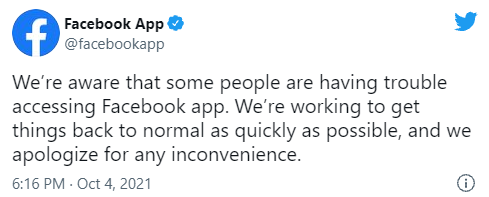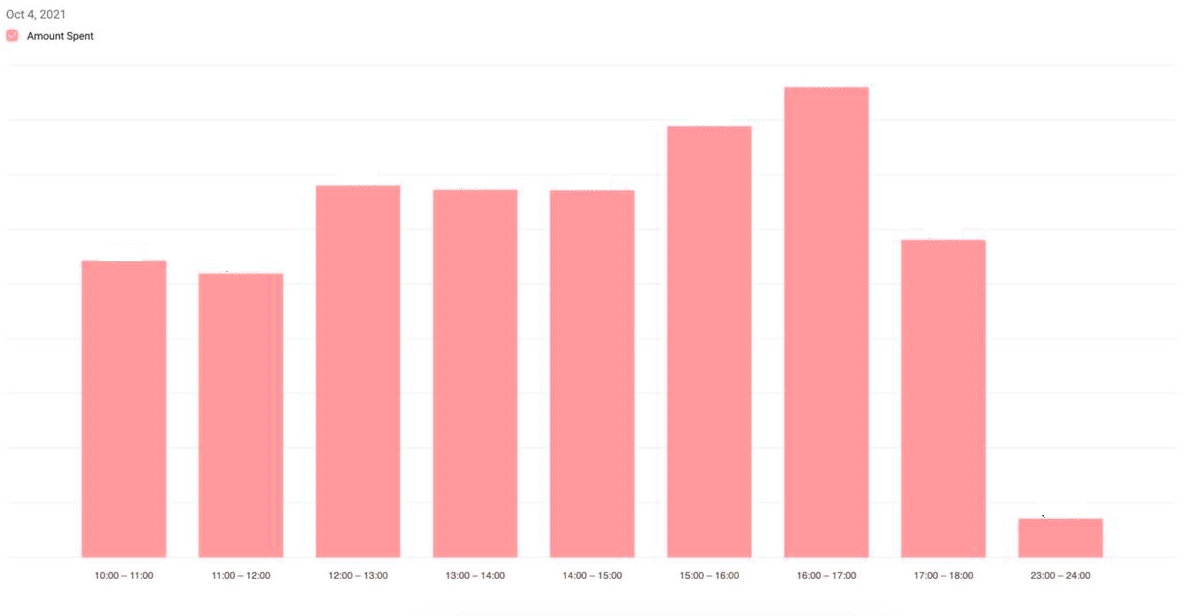General Black-out
On october 4th, all Facebook services were back online after an outage that lasted over 5 hours.
Reports of problems with Facebook apps appeared on a website called DownDetector on Monday around 17.30 CET. At that point, all apps and services of Facebook Inc were not loading/accessible. Meaning that Facebook, Messenger, Instagram and WhatsApp were not working at all. In a tweet, Facebook said that it was aware of the issues and was “working to get things back to normal as quickly as possible.” Instagram and WhatsApp both made similar announcements on Twitter.

Facebook Business Manager and all Ad Accounts were also not accessible during that period of time. We had strong suspicions on Monday evening that the outage also resulted in all campaigns being offline: no audiences should also mean no impressions.
Upon having a closer look at the data we saw on Tuesday morning, this was confirmed. Our normal spend started to drop towards 6PM CET, with no budget being invested at all between 6 PM and 11 PM CET. Just before midnight, most campaigns were switched back on as the Facebook services became available again.

The outage resulted in a temporarily drop in investments across the Facebook Inc social networks, but other then that at this point we have no evidence that any data has been lost, nor ads being targeted at incorrect audiences.
Internal Facebook Documents Leaked
Over the past week, a Facebook Whistleblower leaked multiple internal Facebook documents to the Wall Street Journal (WSJ). The series of documents formed the basis for what the WSJ calls the “Facebook Files.”
The documents allege that Facebook:
- Exempts a “Secret Elite” from Facebook’s Policy Enforcement
- Knows that Instagram is toxic for many teen girls
- Attempts to make the platform “Healthier” instead made the platform “Angrier.”
- Is used by drug cartels and human traffickers, and the company response is weak.
- Bad actors undermined efforts by Facebook to support America’s COVID-19 Vaccination effort.
- Is intent on attracting preteens to the platform, beyond plans for Instagram Kids.
The reports on each of the above, and analysis of Facebook’s work on Instagram Kids, Mental Health on Facebook, and Sheryl Sandberg’s power at the company are available here on the WSJ website.
The WSJ report culminated in a 60 minutes interview on Sunday October 3rd with the Facebook Whistleblower responsible for the leaked documents. The leaker was revealed to be Frances Haugen, a former Product Manager at Facebook responsible for “Civic Integrity”. Haugen has also worked with external legal counsel to share the documents with US Securities and Exchange Commission (SEC). The SEC does not have oversight of social platforms but could possibly investigate Facebook if the documents suggest that Facebook misled investors and the financial market.
Facebook’s own Oversight Board has requested more information on issue #1, concerned about possible policy exemptions and requested more information.
Facebook Response
Facebook has responded with several blog posts.
- Explaining the motives behind the research
- Refuting and analyzing the WSJ interpretation on the risk Instagram poses to teen girls
- A response to the Facebook Oversight Boards’ request for more details on policy exemptions for certain individuals
In regards to the recent 60minutes interview, Facebook shared the following:
CBS 60 Minutes used select company materials to tell a misleading story about the research we do to improve our products and disregards the significant investments we make to keep people safe on our platform. We do internal research to ask hard questions and find out how we can best improve the experience for people on our platform. We have a strong track record of using our research — as well as external research and close collaboration with experts and organizations — to inform changes to our apps and improve our products and policies. Some of this research has recently been mischaracterized, such as our research on teen girls’ experience with Instagram and social media that demonstrates our commitment to understanding complex and difficult issues young people struggle with. We will continue to proactively identify areas for improvement through research and with input from experts.
Every day, our teams have to balance protecting the ability of billions of people to express themselves openly with the need to keep our platform a safe and positive place. We’ve invested heavily in people and technology to keep our platform safe, and have made significant improvements to tackle the spread of misinformation and harmful content. While there’s always more to be done, we continue to make progress. For instance, hate speech prevalence on Facebook has decreased by almost 50% for three quarters in a row since we first began reporting it last year — in our last Community Standards Enforcement Report (CSER), it was about 0.05%, or about 5 views per every 10,000 views of content on Facebook. While we will never be perfect, we’ll continue to invest in and prioritize the important work of protecting our community. And we remain committed to our company mission of bringing the world closer together.
Public and Lobby Group Reaction
At the time of writing, the public reaction to the revelations are still playing out. Both 60 Minutes, #DeleteFacebook, and Frances Haugen have trended on Twitter. There are currently no calls by groups such as StopHateForProfit to boycott Facebook.
At present, the recommendation is to maintain a watching brief on the story as it plays out.
While there is a theme in each story that Facebook’s alleged failures are to drive engagement and in turn advertising, to date, advertisers themselves have not been the subject of the debate.
The Mediabrands Brand Safety team will continue to monitor and share information as it becomes available.
If you have any questions about these recent events, please do not hesitate to reach out to your contact persons at our agency.
